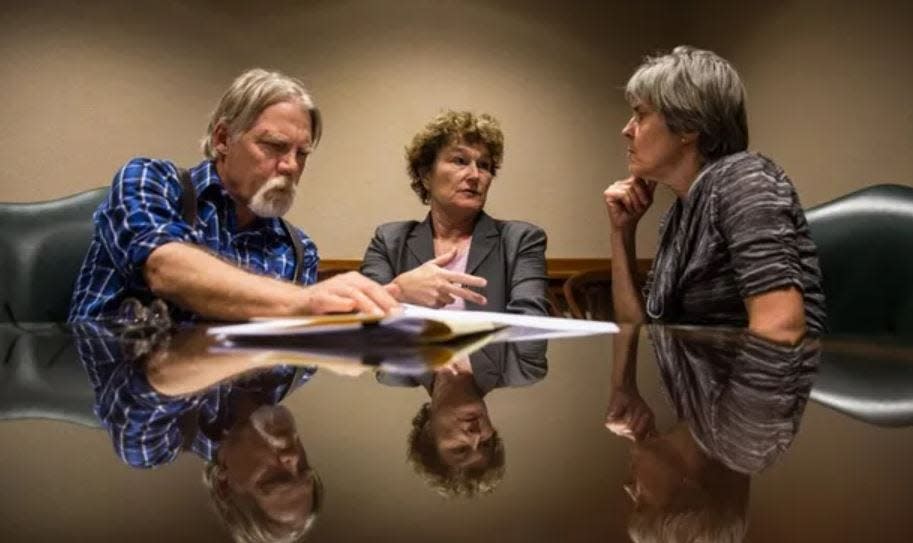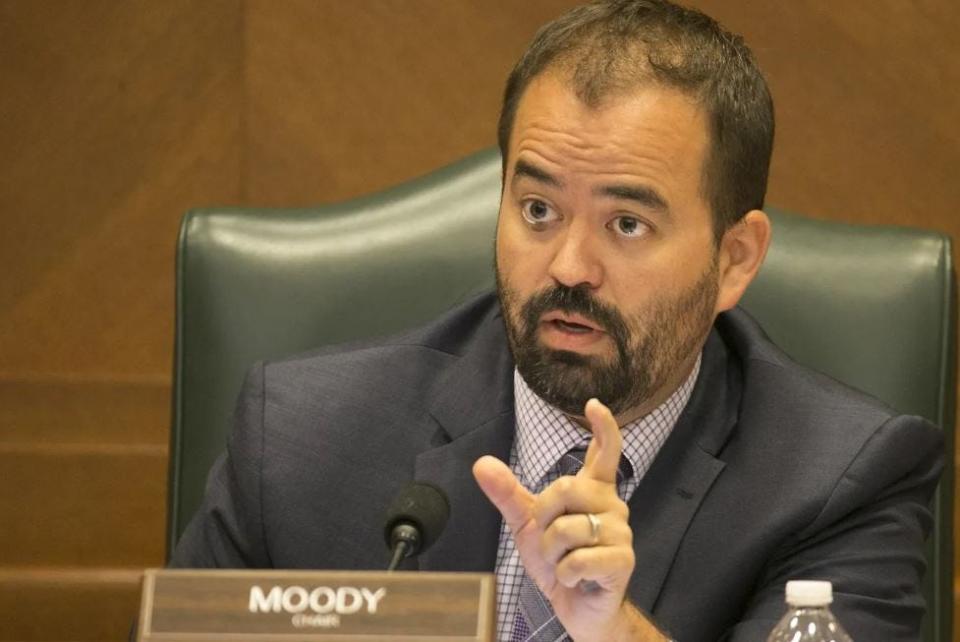Why Texas lawmakers are looking to end the 'dead suspect loophole'
- Oops!Something went wrong.Please try again later.
- Oops!Something went wrong.Please try again later.
AUSTIN — A gap in the state's open government laws allowed family members of last year's mass shooting victims in Uvalde to be kept in the dark about how law enforcement reacted in real time. That gap could finally be closed under legislation heard Wednesday by a legislative panel.
The measure, House Bill 30 by El Paso Democrat Joe Moody, would close what has been called "the dead suspect loophole" that has been used by law enforcement agencies to block the release of police records until a suspect has been convicted. However, when a suspect dies before trial either at the hand of law enforcement or while in custody, there is no possibility of conviction.
The shooter who gunned down 19 children and two teachers in Uvalde's Robb Elementary School on May 24, 2022, was killed by a team from the U.S. Border Patrol. But because of the loophole, Uvalde families have not been able to obtain a clear picture on why the state and local law enforcement officers on the scene had allowed 77 minutes to pass before the gunman was shot dead.
Much of what is known has come not from law enforcement, but from the special House committee formed by Speaker Dade Phelan to examine the shooting.

“Uvalde underscores how crucial this is," Moody, who was a member of the special panel, told the House State Affairs Committee. "The video you’ve all seen of that incident is only out there because (state Rep. Dustin Burrows, the special committee chairman) took the courageous step of announcing that he intended to release the video ... to get the truth out.
More: Exclusive: Watch Uvalde school shooting video obtained by Statesman showing police response
"If he hadn’t, it would still be secret today — even for the families whose children never came home that day.”
A family's frustration with dead suspect loophole
Since even before the Uvalde mass shooting, Moody has tried without success to close the loophole. And working with him for the past several years have been Robert and Kathy Dyer. In 2013, their 18-year-old son, Graham, died after being taken to jail by police in the Dallas suburb of Mesquite.
The couple battled with authorities in Mesquite to learn the details of Graham's death but were denied access to many of the official reports, they told the House panel in separate testimony. It was not until after the FBI examined the circumstances that the Dyers were able to obtain the video that showed officers shocking their son by hitting him in the testicles with a Taser.
Graham Dyer had apparently been having a bad reaction to LSD and had been banging his head repeatedly into hard objects, and the arresting officers taking him to jail were unable to control him. They did not seek medical help so his self-injuries could be treated. Dyer was found unresponsive in his jail cell and and died the next day in the hospital. He would have turned 19 in less than a week.
Nearly 10 years after their son's death, Robert and Kathy Dyer remain outraged that police were not required to disclose the video and to provide a full accounting of what had happened while Graham was in custody.
"We give police vast amounts of authority," Robert Dyer said in an interview after he testified. "We give them, in essence, the authority over life and death. So we must have oversight because you don't want to (establish a police force) and just let it run wild. Because it can."
The State Affairs Committee did not act on the legislation but might in a future hearing. Phelan, in a tweet during the aftermath of Uvalde, said it was past time to close the loophole.
Police worry about personnel files becoming public
However, a representative for a statewide police organization expressed concern that the legislation might have the effect of opening otherwise confidential personnel files of law enforcement officers — including those detailing unproven or false allegations of misconduct — to public scrutiny.
"The release of such information to the public leaves it open for interpretation for interest groups and other groups, and it also causes damage to that officer," said Marvin Ryals, a lieutenant in the El Paso County Sheriff's Office and president of the police union umbrella group, the Combined Law Enforcement Association of Texas.
Ryals said he would not oppose allowing public access to video like the one described in the Dyer case. But he was adamant that reports containing unfounded accusations against officers should not be made public.

Moody told the committee his bill would not throw open the confidential personnel files of officers showing unfounded accusations and that it was "inaccurate or outright disingenuous" to suggest otherwise.
"We're not opening the (personnel) file generally," Moody said. "We're not getting after past allegations or anything if it doesn't have to do with a dead suspect."
John C. Moritz covers Texas government and politics for the USA Today Network in Austin. Contact him at jmoritz@gannett.com and follow him on Twitter @JohnnieMo.
This article originally appeared on Corpus Christi Caller Times: Texas laws allows secrecy when a suspect is killed or dies in custody

